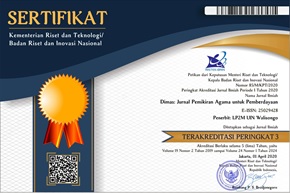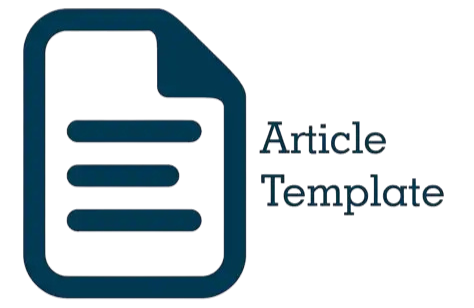Pendampingan Sosialisasi Cemaran Khamr dan Alkohol Dalam Makanan Sebagai Persiapan Menghadapi Sertifikasi Halal
DOI:
https://doi.org/10.21580/dms.2022.222.10838Keywords:
assistance, halal certification, khamr, alcohol contaminationAbstract
One of the food-product halalness indicator is the absence of alcohol. In this case, traders as business actors must know about the contamination of khamr and alcohol in food ingredients that are traded so as not to endanger themselves and consumersas a condition when applying for halal certification. Because the content of khamr and alcohol besides endangering health, the Qur'an also clearly forbids them.Therefore this community service aims to increase the knowledge of shop owners around IAIN Surakarta regarding the contamination of khamr and alcohol in food as an effort to prepare for halal certification. This activity is carried out using the socialization method, namely by giving lectures and questions and answers to 10 food stall owners. Activity evaluation is carried out by providing a pre-test and post-test on the topic presented. From this community service activity, there was an increase in knowledge which could be seen from the pre-test and post-test scores, which were respectively 36 and 86. Specifically, the increase in knowledge about the definition of alcohol and khamr was 50%, the rules of the beverage trade. alcohol in Indonesia is 50%, types of alcoholic drinks are 60%, and the law of alcohol and khamr in Islam is 30%.
Downloads
References
Agus, P. A. (2017). Kedudukan Sertifikasi Halal Dalam Sistem Hukum Nasional Sebagai Upaya Perlindungan Konsumen Dalam Hukum Islam. Amwaluna: Jurnal Ekonomi Dan Keuangan Syariah, 1(1), 150–165. https://doi.org/10.29313/amwaluna.v1i1.2172
Al-Qaradawi, Y. (1984). The Lawful and the Prohibited in Islam. Hindustan Publishing.
Ali, M. (2016). Konsep Makanan Halal dalam Tinjauan Syariah dan Tanggung Jawab Produk Atas Produsen Industri Halal. AHKAM: Jurnal Ilmu Syariah, 16(2), 291–306. https://doi.org/10.15408/ajis.v16i2.4459
Bashir, A. M. (2019). Effect of halal awareness, halal logo and attitude on foreign consumers’ purchase intention. British Food Journal, 121(9), 1998–2015. https://doi.org/10.1108/BFJ-01-2019-0011
Brooks, P. J., & Theruvathu, J. A. (2005). DNA adducts from acetaldehyde: implications for alcohol-related carcinogenesis. Alcohol, 35(3), 187–193. https://doi.org/10.1016/j.alcohol.2005.03.009
Dudley, R. (2004). Ethanol, Fruit Ripening, and the Historical Origins of Human Alcoholism in Primate Frugivory. Integrative and Comparative Biology, 44(4), 315–323. https://doi.org/10.1093/icb/44.4.315
Faridah, H. D. (2019). Halal certification in Indonesia; history, development, and implementation. Journal of Halal Product and Research, 2(2), 68–78. https://doi.org/10.20473/jhpr.vol.2-issue.2.68-78
Fatwa Majelis Ulama Indonesia No 10 Tahun 2018 tentang Produk Makanan dan Minuman yang Mengandung Alkohol/ Etanol, (2018).
Herawati, W. P., & Rachmawati, A. (2020). Hukuman Bagi Peminum Khamr Pada Putusan Pengadilan Negeri Klaten No 148/Pid.C/2018/ PN.Kln Dalam Tinjauan Fiqh Islam (Studi Perbandingan). Journal of Indonesian Comparative of Law, 3(1), 73–90. https://doi.org/10.21111/jicl.v3i1.4514
Peraturan Menteri Perdagangan Nomor 20/M-Dag/Per/4/2014 Tentang Pengendalian Dan Pengawasan Terhadap Pengadaan, Peredaran, Dan Penjualan Minuman Beralkohol, (2014). https://peraturan.bpk.go.id/Home/Download/119447/Permendag No. 120 Tahun 2018.PDF
Peraturan Menteri Perdagangan tentang Pengendalian dan Pengawasan Terhadap Pengadaan, Peredaran, dan Penjualan Minuman Beralkohol, (2019). https://peraturan.bpk.go.id/Home/Details/129077/permendag-no-20m-dagper42014-tahun-2014#:~:text=Permendag No. 25 Tahun 2019,Peredaran%2C Dan Penjualan Minuman Beralkohol
Mahmud, H. (2020). Hukum Khamr dalam Perspektif Islam. Maddika: Journal Of Islamic Family Law, 1(1), 28–47. https://doi.org/10.24256/maddika.v1i1.1559
Malik, A. J. (2013). Sejarah Sosial Hukuman Peminum Khamr. Al-Daulah: Jurnal Hukum Dan Perundangan Islam, 3(1), 42–56. https://doi.org/10.15642/ad.2013.3.1.42-56
Mansur, A. R., Oh, J., Lee, H. S., & Oh, S. Y. (2022). Determination of ethanol in foods and beverages by magnetic stirring-assisted aqueous extraction coupled with GC-FID: A validated method for halal verification. Food Chemistry, 366, 130526. https://doi.org/10.1016/j.foodchem.2021.130526
Martins, M. S., Ferreira, M. S., Almeida, I. F., & Sousa, E. (2022). Occurrence of Allergens in Cosmetics for Sensitive Skin. Cosmetics, 9(2), 32. https://doi.org/10.3390/cosmetics9020032
Mehta, A. J. (2016). Alcoholism and critical illness: A review. World Journal of Critical Care Medicine, 5(1), 27. https://doi.org/10.5492/wjccm.v5.i1.27
Nukeriana, D. (2018). Implementasi Sertifikasi Halal Pada Produk Pangan di Kota Bengkulu. Jurnal Qiyas: Hukum Islam Dan Peradilan, 3(1), 154–165. https://doi.org/10.29300/qys.v3i2.1310
Rahayuningsih, E., & Ghozali, M. L. (2021). Sertifikasi Produk Halal dalam Perspektif Mashlahah Mursalah. Jurnal Ilmiah Ekonomi Islam, 7(1), 135–145. https://doi.org/10.29040/jiei.v7i1.1929
Riaz, M. N., & Chaudry, M. M. (2018). Handbook of Halal Food Production (M. N. Riaz & M. M. Chaudry (eds.)). CRC Press. https://doi.org/10.1201/9781315119564
Risna. (2017). Pandangan Sains dan Al-Qur’an terhadap Konsumsi Alkohol. Seminas Nasional MIPA III. https://www.conference.unsyiah.ac.id/SN-MIPA/3/paper/view/881
Rusdan, I. H., & Anggrella, D. P. (2021). Sosialisasi Cemaran Babi sebagai Persiapan Sertifikasi Halal pada Warung Makan di Kartasura. Dimas: Jurnal Pemikiran Agama Untuk Pemberdayaan, 21(2), 257–274. https://doi.org/10.21580/dms.2021.212.9093
Santana, N. M. T., Mill, J. G., Velasquez-Melendez, G., Moreira, A. D., Barreto, S. M., Viana, M. C., & Molina, M. del C. B. (2018). Consumption of alcohol and blood pressure: Results of the ELSA-Brasil study. PLOS ONE, 13(1), e0190239. https://doi.org/10.1371/journal.pone.0190239
Shukriya, A. J., & Faridah, H. D. (2019). Science and technology studies of the causes of prohibited foods in Islamic law. Journal of Halal Product and Research, 2(1), 44–50. https://doi.org/10.20473/jhpr.vol.2-issue.1.44-50
Warto, & Samsuri, S. (2020). Sertifikasi Halal dan Implikasinya Bagi Bisnis Produk Halal di Indonesia. Al Maal: Journal of Islamic Economics and Banking, 2(1), 98–112. https://doi.org/10.31000/almaal.v2i1.2803
Winarno, W. (2018). Status Hukum Khamar dalam Perspektif Fiqh. Asy Syar’iyyah: Jurnal Ilmu Syari’ah Dan Perbankan Islam, 3(1), 1–25. https://doi.org/10.32923/asy.v3i1.692
Zumaroh, & Budiati, R. E. (2015). Perilaku Konsumsi Minuman Keras pada Remaja di Desa Kunir Kecamatan Keling Kabupaten Jepara. Jurnal Keperawatan Dan Kesehatan Masyarakat Cendekia Utama, 4(2), 77–84. https://doi.org/10.31596/jcu.v1i4.83
Downloads
Published
Issue
Section
License
Copyright
The copyright of the received article shall be assigned to the journal as the publisher of the journal. The intended copyright includes the right to publish the article in various forms (including reprints). The journal maintains the publishing rights to the published articles. Therefore, the author must submit a statement of the Copyright Transfer Agreement.*)
Licensing

This work is licensed under a Creative Commons Attribution-ShareAlike 4.0 International License.
In line with the license, authors are allowed to share and adapt the material. In addition, the material must be given appropriate credit, provided with a link to the license, and indicated if changes were made. If authors remix, transform or build upon the material, authors must distribute their contributions under the same license as the original.
_______
*) Authors whose articles are accepted for publication will receive confirmation via email and send a Copyright Transfer Agreement.









